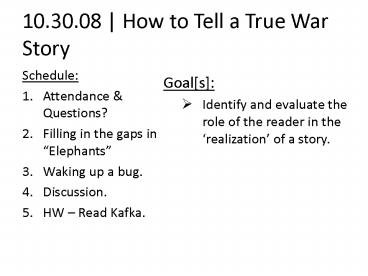10'30'08 How to Tell a True War Story - PowerPoint PPT Presentation
1 / 7
Title:
10'30'08 How to Tell a True War Story
Description:
How to Tell a True War Story: Reader has to assemble the distributed fragments ... He also tells you what a true story should be in broken bits. ... – PowerPoint PPT presentation
Number of Views:142
Avg rating:3.0/5.0
Title: 10'30'08 How to Tell a True War Story
1
10.30.08 How to Tell a True War Story
- Schedule
- Attendance Questions?
- Filling in the gaps in Elephants
- Waking up a bug.
- Discussion.
- HW Read Kafka.
- Goals
- Identify and evaluate the role of the reader in
the realization of a story.
2
Readers Role Where are we?
- Hills Like White Elephants Reader is charged
with filling in the scene around the sparse
dialogue. - Metamorphosis Reader has to suspend disbelief
consistantly, to accept the storys central
conceit. - How to Tell a True War Story Reader has to
assemble the distributed fragments and wade
through the ambiguities.
3
Amending some of our habits.
- Having followed along with GoPost and now having
read about half of your papers, it occurs to me
we have gotten into some unproductive habits of
talking about the texts. - The questions we have been asking have generally
been How does X affect your immersion? - While there is nothing inherently wrong with this
question, it is not generating useful responses. - We tend to reply with how it affected OUR
PERSONAL immersion, which means each of us is
talking about something different. OR, it leads
to evaluative statements that people are not
substantiating. - Now I have been noticing the same trend with
questions about interactivity, only its more
marked now as we have no definition yet
formulated as to what that means. - INSTEAD, lets ask this question as What does it
mean to be immersed/interactive with this text? - Hopefully, this shift will allow us to talk
specifically about what the text is doing rather
than our reactions.
4
Also
- It is no longer acceptable to explain the impact
of some element of a text as - More interesting. to whom?
- More entertaining. for whom?
- Appealing to a larger audience. who cares?
- Unless you can connect the statement to stakes
other than broader readership or book sales. - Remember STAKES!?! Who cares and why? To simply
notice/point out some element of a text is
descriptive. Instead, your observations need to
serve as evidence for a claim about what the
text/element is doing/arguing/articulating.
5
How to Tell a True War Story
- Simple question that is actually pretty
complicated What is this?
6
Interactivity
- What does it mean to interact with this text?
- How is that interaction elicited?
- What are the effects, implications, results, of
interacting in this way? - dont say it makes it more interesting/entertaini
ng! Or connects with a larger audience!
7
Discussion.
- In the following excerpt, how does Michell
Sanders' telling of his war story parallel the
narrator's telling of the story about Curt Lemon?
In what ways does this define the reader's role
in reading the text? - 176-179
- In this text, the author interjects almost every
snippet of a war story by telling you it's true
and sometimes even the degree of truth. He also
tells you what a true story should be in broken
bits. - While I found this to be extremely irritating, I
wanted to hear what others had to say about it.
Were you able to suspend your disbelief and
actually listen to the author and believe the
story was true? How did this conflict/agree with
Ryan's definition of immersion, could you
actually get into the text and forget about the
medium to access the text?Also, the readings
this week have been open-ended and up to your own
interpretation, what do you think was the point
O'Brien was trying to get across?






![[PDF]DOWNLOAD Battle Scars: A Story of War and All That Follows PowerPoint PPT Presentation](https://s3.amazonaws.com/images.powershow.com/10060042.th0.jpg?_=20240621016)
![[PDF]❤️DOWNLOAD⚡️ Battle Scars: A Story of War and All That Follows PowerPoint PPT Presentation](https://s3.amazonaws.com/images.powershow.com/10059774.th0.jpg?_=20240620121)
![[PDF]❤️DOWNLOAD⚡️ Battle Scars: A Story of War and All That Follows PowerPoint PPT Presentation](https://s3.amazonaws.com/images.powershow.com/10057893.th0.jpg?_=20240618037)
![[DOWNLOAD]PDF Unbroken: A World War II Story of Survival, Resilience, and Redemption PowerPoint PPT Presentation](https://s3.amazonaws.com/images.powershow.com/10106302.th0.jpg?_=20240823112)
![[DOWNLOAD]PDF Unbroken: A World War II Story of Survival, Resilience, and Redemption PowerPoint PPT Presentation](https://s3.amazonaws.com/images.powershow.com/10106311.th0.jpg?_=20240823113)

![[PDF]DOWNLOAD Unbroken (Movie Tie-in Edition): A World War II Story of Survival, Resilienc PowerPoint PPT Presentation](https://s3.amazonaws.com/images.powershow.com/10106301.th0.jpg?_=20240823112)
![[PDF]DOWNLOAD Unbroken (Movie Tie-in Edition): A World War II Story of Survival, Resilienc PowerPoint PPT Presentation](https://s3.amazonaws.com/images.powershow.com/10106310.th0.jpg?_=20240823112)
![READ [PDF] Kaffir Boy: An Autobiography--The True Story of a Black You PowerPoint PPT Presentation](https://s3.amazonaws.com/images.powershow.com/10136532.th0.jpg?_=20240923067)
![Read [PDF] God Save Benedict Arnold: The True Story of Ameri PowerPoint PPT Presentation](https://s3.amazonaws.com/images.powershow.com/10119324.th0.jpg?_=20240903094)



![READ [PDF] Frozen in Time Low Price CD: An Epic Story of Survival and a Modern Quest for PowerPoint PPT Presentation](https://s3.amazonaws.com/images.powershow.com/10106335.th0.jpg?_=20240823115)

![[PDF]⚡️Download ⚡️ The Epic Book Of World War II Heroes: 27 Fearless Men That Changed the War PowerPoint PPT Presentation](https://s3.amazonaws.com/images.powershow.com/10071550.th0.jpg?_=20240703111)
![❤️[READ]✔️ The Spy in Moscow Station: A Counterspy's Hunt for a Deadly Cold War Threat PowerPoint PPT Presentation](https://s3.amazonaws.com/images.powershow.com/10122574.th0.jpg?_=20240906029)
![read[pdf] horse soldiers: the extraordinary story of a band PowerPoint PPT Presentation](https://s3.amazonaws.com/images.powershow.com/10136614.th0.jpg?_=202409230810)
![[PDF] DOWNLOAD Hell Hawks!: The Untold Story of the American Fliers Wh PowerPoint PPT Presentation](https://s3.amazonaws.com/images.powershow.com/10119464.th0.jpg?_=20240904011)






